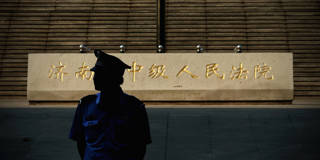Over the past decade, China has arrested and indicted hundreds of senior government officials and more than a million low-ranking civil servants in an effort to root out corruption. A new study suggests that while bribery remains widespread, the government’s sweeping anti-corruption measures have been at least partly successful.
MADISON/NEW YORK – Bribery of public officials remains a major problem across the developing world and in some developed countries, too. Studies have repeatedly shown that graft impedes economic growth and development, prompting governments around the world to intensify their efforts to root out corruption. China’s anti-corruption drive stands out in this regard, having led to the arrest or indictment of hundreds of high-ranking officials, as well as more than a million lower-level government representatives, since 2013.
Corruption increases the cost of doing business, impeding economic efficiency and undermining fairness across the economy and society. But, given that bribery typically occurs under the table, estimating the extent and scope of illicit earnings is extremely difficult. One way to do this is to apply the permanent income theory, which establishes a link between household wealth and big-ticket consumer purchases.
In a forthcoming paper in Management Science, we and our co-authors employ this methodology to estimate Chinese government officials’ “unofficial” income. Analyzing data on home purchases and incomes in a major Chinese city between 2006 and 2013, we compare households with a government official to those without one. We then examine the relationship between the value of homes acquired and household wealth, accounting for factors like the official’s gender, age, and education level.

MADISON/NEW YORK – Bribery of public officials remains a major problem across the developing world and in some developed countries, too. Studies have repeatedly shown that graft impedes economic growth and development, prompting governments around the world to intensify their efforts to root out corruption. China’s anti-corruption drive stands out in this regard, having led to the arrest or indictment of hundreds of high-ranking officials, as well as more than a million lower-level government representatives, since 2013.
Corruption increases the cost of doing business, impeding economic efficiency and undermining fairness across the economy and society. But, given that bribery typically occurs under the table, estimating the extent and scope of illicit earnings is extremely difficult. One way to do this is to apply the permanent income theory, which establishes a link between household wealth and big-ticket consumer purchases.
In a forthcoming paper in Management Science, we and our co-authors employ this methodology to estimate Chinese government officials’ “unofficial” income. Analyzing data on home purchases and incomes in a major Chinese city between 2006 and 2013, we compare households with a government official to those without one. We then examine the relationship between the value of homes acquired and household wealth, accounting for factors like the official’s gender, age, and education level.